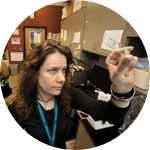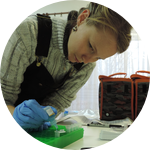Wildlife Diseases
Categories

A healthy planet is predicated on healthy and biodiverse populations. While diseases among wildlife are anything but new, they continue to evolve and require close monitoring to protect stable ecosystems, and ensure vulnerable species that have been already pushed to the brink of extinction due to human activities are not lost.
The Projects
Browse the participating projects
Are endangered tigers in Nepal threatened by diseases from dogs and cats?
Through our wildlife health work in Nepal, we have seen sick tigers that show symptoms similar to canine...
Why are some bats naturally immune to White-nose Syndrome.
With more than 5 million bats already dead, White-nose Syndrome (WNS) is one of the most devastating wildlife...
Can we stop amphibian extinction by increasing immunity to the frog chytrid fungus?
As a result of the arrival of the chytrid fungus in Australia, corroboree frog populations declined so now...
Chernobyl’s Legacy: Does radiation exposure affect parasite and disease rates in two of Chernobyl's carnivores?
Radioactive material released by the Chernobyl accident is claimed to have created one of the largest ecological...
Ticks carry more than Lyme disease in California – are Californians at risk?
The western blacklegged tick carries the pathogens B. burgdorferi (cause of Lyme disease) and B. miyamotoi...
More About This Challenge
The sciency details
Challenge Aims
Emerging infectious diseases are arising in new geographic regions and affecting new populations as a result of changing human demographics, land use, the exotic pet trade, and climate change. The Centers for Disease Control and Prevention estimate that among currently emergent infectious human diseases, 75% come directly from an animal reservoir and that 60% of all pathogens affecting humans are of zoonotic origin. Additionally, the National Institute of Allergy and Infectious Diseases estimates that there are at least 30 emerging infectious diseases that are slated to significantly threaten human health in this century. Understanding the pathogens that affect wildlife requires broad multidisciplinary investigation including all aspects of host and pathogen biology, ecological interactions, surveillance, vaccine development, land use strategies, and domestic and international policy.
We are calling for research proposals on any aspect of wildlife disease research, whether it focuses on a species-specific disease, a pathogen that affects an entire group of animals, or seeks to gain more understanding of a zoonotic disease from the vector, host, transmission, or prevention perspective. If you are not sure if your project qualifies, contact us and we’d love to talk to you about it.
We will review proposals and plan to launch qualifying projects at the end of August. Projects will have run for 30 days to fundraise for set "all or nothing" goals. After three weeks of campaigning, the projects with the most backers will receive a bonus amount donated to their campaigns on top of their raised funds.
Project Eligilibity
Any project working on wildlife disease is invited to participate -- please get in touch if you aren't sure about your idea, by emailing us at support@experiment.com. Interdisciplinary projects are more than welcome! Researchers must be based out of institutions or organizations in the US, UK, Australia, or Canada.





 Challenge Grants
Challenge Grants